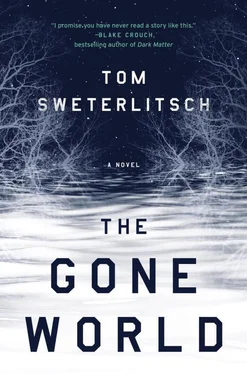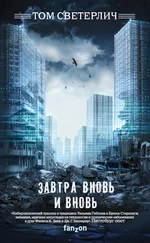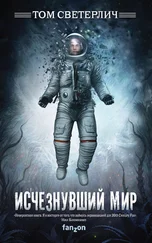Том Светерлич - The Gone World
Здесь есть возможность читать онлайн «Том Светерлич - The Gone World» весь текст электронной книги совершенно бесплатно (целиком полную версию без сокращений). В некоторых случаях можно слушать аудио, скачать через торрент в формате fb2 и присутствует краткое содержание. Город: New York, Год выпуска: 2018, ISBN: 2018, Издательство: G. P. Putnam's Sons, Жанр: Детективная фантастика, Триллер, на английском языке. Описание произведения, (предисловие) а так же отзывы посетителей доступны на портале библиотеки ЛибКат.
- Название:The Gone World
- Автор:
- Издательство:G. P. Putnam's Sons
- Жанр:
- Год:2018
- Город:New York
- ISBN:978-0-39916-750-8
- Рейтинг книги:5 / 5. Голосов: 1
-
Избранное:Добавить в избранное
- Отзывы:
-
Ваша оценка:
- 100
- 1
- 2
- 3
- 4
- 5
The Gone World: краткое содержание, описание и аннотация
Предлагаем к чтению аннотацию, описание, краткое содержание или предисловие (зависит от того, что написал сам автор книги «The Gone World»). Если вы не нашли необходимую информацию о книге — напишите в комментариях, мы постараемся отыскать её.
The Gone World — читать онлайн бесплатно полную книгу (весь текст) целиком
Ниже представлен текст книги, разбитый по страницам. Система сохранения места последней прочитанной страницы, позволяет с удобством читать онлайн бесплатно книгу «The Gone World», без необходимости каждый раз заново искать на чём Вы остановились. Поставьте закладку, и сможете в любой момент перейти на страницу, на которой закончили чтение.
Интервал:
Закладка:
“Why my involvement?” she asked.
“My understanding’s that our SAC communicated with HQ and they instructed him to involve you,” said Nestor. “They want NCIS assistance. Our primary is a Navy SEAL.”
“Where?”
“Canonsburg, on a street called Cricketwood Court, just off Hunter’s Creek,” he said.
“Hunting Creek.”
She knew Hunting Creek, Cricketwood Court—her best friend growing up had lived on that street, Courtney Gimm. The image of Courtney’s face floated from Moss’s memory like ice surfacing through water.
“How many victims are we dealing with?”
“Triple homicide,” said Nestor. “It’s bad. I’ve never—”
“Slow down.”
“I’d seen some kids hit by a train once, but nothing like this,” he said.
“Okay,” said Moss. “You said the call came in after midnight?”
“A little later,” said Nestor. “A neighbor heard commotion, finally called the police—”
“Do you have someone speaking with the neighbor?”
“One of our guys is with her now,” he said.
“I’ll make it there in a little over an hour.”
She gained her equilibrium before attempting to stand—her right leg still the lean, muscled leg of an athlete, but her left terminated in a conical mid-thigh stump, the end muscle and flesh there wrapped like a fold-over pastry. She’d lost her leg years ago when she’d been crucified in the deep winter of the Terminus—a transfemoral amputation, the Navy surgeons having cut away the part of her that had gone gangrenous. When she stood, she perched on her single foot like a long-legged shore bird, rocking on the pads of her toes for balance. Her crutches were within reach, Lofstrand crutches she kept propped in the gap between her bed and nightstand. She slipped her forearms through the cuffs and gripped the handles, propelling herself through her bedroom, a cluttered mess of clothes and magazines, loose CDs, empty jewel cases—slipping hazards her occupational therapist had warned her against.
Cricketwood Court…
A shiver passed over Moss at the thought of returning. She and Courtney had been like sisters through middle school, freshman year—closer than sisters, inseparable. Moss’s memories of Courtney were the sweetest essence of childhood summers—endless days spent poolside, roller coasters at Kennywood, splitting cigarettes down by Chartiers Creek. Courtney had died their sophomore year, murdered in a parking lot for the few dollars she’d had in her purse.
Headline News on the bedroom set while she dressed. She applied antiperspirant to her residual limb, then nestled her polyurethane liner against the blunt edge of her thigh, rolling it to her hip as if she were rolling on a nylon stocking. She smoothed the rubbery sleeve of any air bubbles that might have accrued against her skin. The prosthesis was an Ottobock C-Leg, a prototype—a computerized prosthesis originally designed for wounded soldiers. Moss slid her thigh into the socket and stood, the volume of her thigh forcing out air from the carbon cuff, vacuum-sealing the prosthesis. The C-Leg made her feel as if her skeleton were exposed—a steel shank instead of a shin. She wore slacks, a blouse the color of pearls. She holstered her service weapon. She wore a tailored suede jacket. A last glance at television: Dolly skulking in her hay-strewn pen, Clinton touting the newly signed human-cloning ban, promos for NBA on NBC , Jordan versus Ewing.
Cricketwood Court was a cul-de-sac, sirens flaring against row houses and lawns. A quarter after 3:00 a.m., neighbors would know something had happened, but they might not know what yet—if they peered from their windows they would find a confusion of patrol units, sheriff’s cars and Canonsburg PD, state police cruisers, investigations a web of jurisdiction by the time federal agents were involved. Moss’s cases tended to concern Naval Space Command sailors home on shore leave from “Deep Waters,” the black-ops missions to Deep Space and Deep Time. Bar fights, domestic violence, drug charges, homicides. She had worked cases where NSC sailors had snapped and beaten their wives or girlfriends to death—tragic occurrences, some sailors spiraling after seeing the terrors of the Terminus or the light of alien suns. She wondered what she would find here. The county coroner’s van was parked nearby. Ambulances and fire engines idled. The FBI mobile crime lab had backed over the berm into the front lawn of her old friend’s house.
“Jesus Christ…”
The house Moss remembered from her childhood was as if superimposed over the house as it stood—two films playing concurrently, a memory and a crime scene. Courtney’s family had long since moved from here, and Moss never thought she would set foot within her old friend’s house again, certainly not under these circumstances. A two-story end unit, the other houses in its row lined up like mirror reflections, each with a driveway, a petite garage, each front stoop lit by a single porch light, the façades identical down the line, brick topped by white vinyl. Growing up, Moss had spent more time here than at her own house, it seemed—she still remembered the Gimms’ old phone number. An oily sensation of one reality oozing into another, like a yolk pouring through a crack in its shell. She took a swig of coffee from her thermos and rubbed her eyes as if to wake herself, to convince herself that this coincidence of houses was real, that she wasn’t caught dreaming. A coincidence , she told herself. There used to be a flowering dogwood in the front yard that had since been hacked down.
Moss slowed her pickup at a sheriff’s blockade, and a deputy approached her window, a middle-aged gut and Chaplinesque mustache that would have been humorous except for the weariness weighing in his eyes. He tried to get her to turn her truck around until she rolled down her window and showed identification.
“What is that?” he asked.
“Naval Criminal Investigative Service,” she said, accustomed to explaining her agency’s initials. “Federal agent. We’re interested in a possible military connection. How bad is it?”
“My buddy was in there earlier and told me this is the worst he’s ever seen, just the goddamned worst,” he said, his breath stale with coffee. “Says there’s not much left of them.”
“Reporters been around?”
“Not yet,” he said. “We were told some news vans are on their way down from Pittsburgh. I don’t think they know what they’ll find. Quiet otherwise. Come on through.”
A lace of police tape cordoned off the lawn and driveway, stretching from a lamppost and looping around the house’s wrought-iron stoop railing. Some of the forensic technicians huddled near the garage, a smoke break. They watched Moss approach without the casual chauvinism or bald stares she sometimes encountered at scenes—their eyes were haunted tonight, glancing her way as if they pitied her for what she was about to endure.
The doorway was draped with a plastic tarp, but the smells of the house assaulted her once she ducked through, the cloying tang of blood and bright rot and shit mingled with chemical stenches of the techs’ solutions, the collection kits and ethanol. The odors seeped into her, a metallic tinge from the blood, her saliva immediately coppery as if she’d sucked on pennies. Criminalists in Tyvek crowded the foyer, busy with evidence preservation, photography. A nervous anticipation roiled Moss in the moments before her first view of a new crime scene; once she turned the corner and saw what she was dealing with, however, her nervousness dissipated, replaced by an urgent and sorrowful compulsion to reassemble the broken pieces as quickly as possible.
A boy and a woman lay on the floor, their faces smeared away in a mince of brain and blood and whorls of bone. Flannel pants on the boy, a jersey for a nightshirt—ten or eleven years old, Moss guessed. The woman’s nightgown was filthy with blood, her bare legs shading to plum where lividity had discolored her. Both had voided their bowels, the floor so sopped that shit and standing blood had pooled in the uneven runnels of the carpeting. The odors gagged her. The smells of the boy and his mother degraded them, she thought, their humanity debased by sewage stink and formlessness.
Читать дальшеИнтервал:
Закладка:
Похожие книги на «The Gone World»
Представляем Вашему вниманию похожие книги на «The Gone World» списком для выбора. Мы отобрали схожую по названию и смыслу литературу в надежде предоставить читателям больше вариантов отыскать новые, интересные, ещё непрочитанные произведения.
Обсуждение, отзывы о книге «The Gone World» и просто собственные мнения читателей. Оставьте ваши комментарии, напишите, что Вы думаете о произведении, его смысле или главных героях. Укажите что конкретно понравилось, а что нет, и почему Вы так считаете.




![Том Светерлич - Завтра вновь и вновь [litres]](/books/401288/tom-sveterlich-zavtra-vnov-i-vnov-litres-thumb.webp)
![Том Светерлич - Исчезнувший мир [litres]](/books/420722/tom-sveterlich-ischeznuvshij-mir-litres-thumb.webp)






